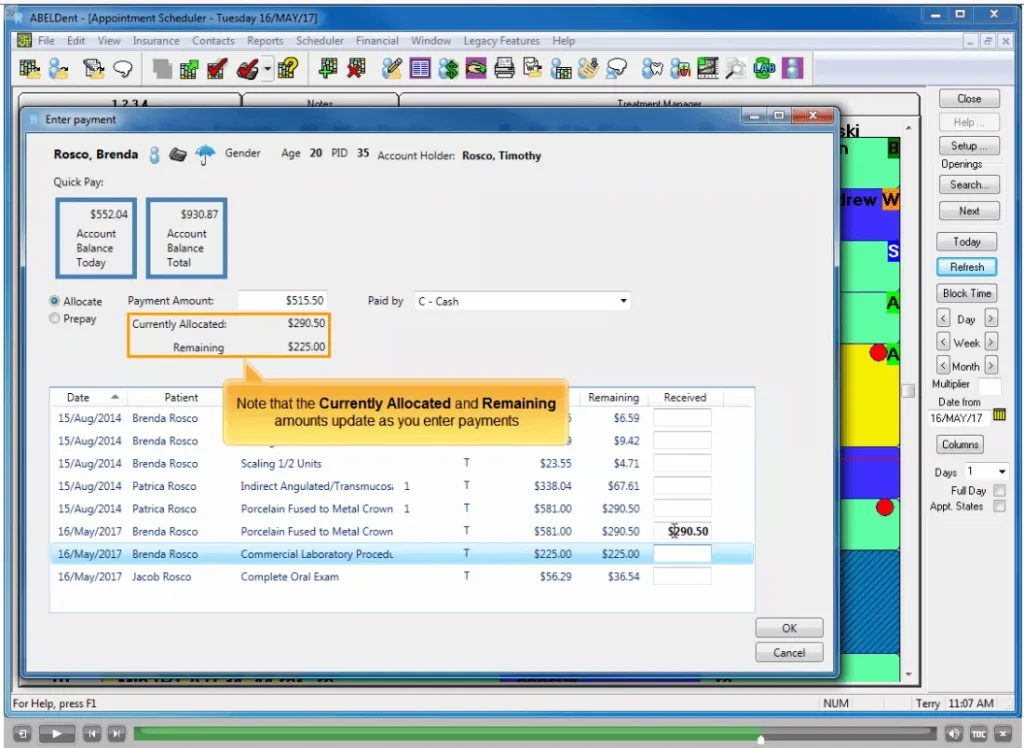Accounting Functions and Reporting
ABELDent’s accounting functions accommodate the needs of your practice.
Accounting functions in a dental office are not always simple – ABELDent can easily handle all the scenarios you may encounter. In summary, ABELDent makes it easy to:
Keep track of practice production and receivables
Maintain separate production totals for all providers
Apply payments to a specific transaction (Open Item accounting)
View billing and accounting transactions in chronological order or open item, in either summary or detailed format (see examples of each patient ledger view below)
Easily make adjustments to correct past entry errors
Track separate insurance and patient portions owing for assignment offices
Estimate insurance coverage by service and account for maximums, deductibles and other limits
Print or preview Financial Reports for any date range – no month end closing required
View patient ledgers in various formats (see below for more detail)
View all family members on an Account Holder ledger and easily create a new financial account for a family member when their family status changes
Make financial transactions/adjustments directly from the patient ledger
View/print a full audit trail for all adjustments and deletions
Easily input bulk and prepayments, and set up monthly charge plans with corresponding post-dated payments
Maintain multiple bank accounts as required
Example: Allocating payments to specific procedures

Patient Ledger Views
| Accounting View Options | Description/Explanation |
|---|---|
| Open and Compact | Displays the relationship between charges and payments. Transactions on the same day for each family member are grouped together. This is useful for easily determining if a specific group of services has been paid. The Ins Bal and Act Bal columns display the remaining balance owed for insurance and patient balance respectively. The overall amount owing for each balance is shown as the last line on the ledger. |
| Open and Detailed | Displays the relationship between charges and payments however, each service appears as a separate transaction. Likewise, each payment for each service appears as a separate transaction. This is useful for easily determining if a specific service has been paid. The Ins Bal and Act Bal columns display the remaining balance owed per service for insurance and patient balance respectively. |
| Open and Compact with Balance Trail | Choosing Balance Trail only will display a running account balance for each group of transactions listed under both the Ins Bal and Act Bal columns. This is useful for determining the insurance and patient balance remaining for each set of grouped services/payments. |
| Open and Detailed with Balance Trail | Choosing Balance Trail with the “Detailed” of the other view options displays a running account balance for each specific service listed under both the Ins Bal and Act Bal columns. This is useful for determining the insurance and patient balance remaining for each specific service. |
| Chronological and Compact | This view is based on the paper ledger-card system and simply lists all financial transactions in the order in which they occur. Transactions on the same day for each family member are grouped together regardless of how payments link to the specific service they may pay. This view always displays a Balance Trail – the dollar value shown in the New Bal column is a running total of the patient balance by date. This provides a simplified view of financial transactions for those who do not require a high level of detail. |
| Chronological and Detailed | This view lists all financial transactions in the order in which they occur and each service and payment appears as a separate transaction. This view also always displays a Balance Trail – the dollar value shown in the New Bal column is a running total of the patient balance by date. This provides a view for those who prefer to see payments separated by each service. |


